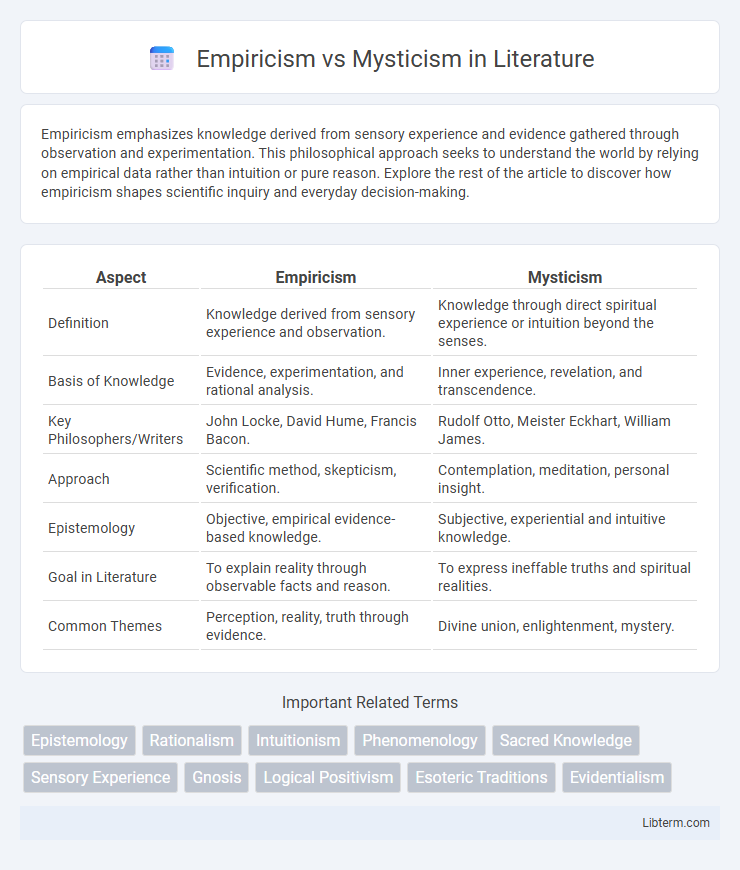Empiricism emphasizes knowledge derived from sensory experience and evidence gathered through observation and experimentation. This philosophical approach seeks to understand the world by relying on empirical data rather than intuition or pure reason. Explore the rest of the article to discover how empiricism shapes scientific inquiry and everyday decision-making.
Table of Comparison
| Aspect | Empiricism | Mysticism |
|---|---|---|
| Definition | Knowledge derived from sensory experience and observation. | Knowledge through direct spiritual experience or intuition beyond the senses. |
| Basis of Knowledge | Evidence, experimentation, and rational analysis. | Inner experience, revelation, and transcendence. |
| Key Philosophers/Writers | John Locke, David Hume, Francis Bacon. | Rudolf Otto, Meister Eckhart, William James. |
| Approach | Scientific method, skepticism, verification. | Contemplation, meditation, personal insight. |
| Epistemology | Objective, empirical evidence-based knowledge. | Subjective, experiential and intuitive knowledge. |
| Goal in Literature | To explain reality through observable facts and reason. | To express ineffable truths and spiritual realities. |
| Common Themes | Perception, reality, truth through evidence. | Divine union, enlightenment, mystery. |
Defining Empiricism: Foundation of Knowledge
Empiricism establishes knowledge through sensory experience and evidence gathered via observation, experimentation, and measurement. Rooted in philosophers like John Locke and David Hume, empiricism emphasizes the importance of empirical data as the foundation for understanding reality and forming justified beliefs. This approach contrasts sharply with mysticism, which relies on intuition, spiritual insight, or revelation rather than observable, verifiable evidence.
Understanding Mysticism: Beyond the Senses
Understanding mysticism requires transcending empirical observation to embrace intuitive and experiential knowledge that defies sensory limitations. Unlike empiricism, which relies on measurable evidence and scientific methods, mysticism explores inner consciousness and spiritual truths through direct personal experience. This approach values subjective insight and metaphysical realities that cannot be quantified or validated by standard empirical criteria.
Historical Roots of Empiricism and Mysticism
Empiricism traces its roots to ancient philosophers like Aristotle, who emphasized observation and sensory experience as the foundation of knowledge, later refined by John Locke and David Hume during the Enlightenment. Mysticism, deeply embedded in spiritual traditions such as Sufism, Kabbalah, and Eastern philosophies, centers on direct, intuitive experiences of the divine beyond rational explanation. The historical contrast highlights empiricism's reliance on measurable phenomena versus mysticism's focus on transcendent, inner revelations.
Methods of Acquiring Truth
Empiricism relies on observation, experimentation, and sensory experience as primary methods for acquiring truth, emphasizing evidence-based knowledge and scientific inquiry. Mysticism, in contrast, centers on introspective practices, spiritual insight, and direct, transcendent experiences beyond sensory perception to attain understanding. Both methods offer distinct approaches: empiricism values objective verification, while mysticism prioritizes personal revelation and inner enlightenment.
Empirical Evidence vs. Mystical Experience
Empirical evidence relies on observable, measurable data acquired through sensory experience and scientific methods, ensuring verifiability and reproducibility in knowledge acquisition. Mystical experience centers on subjective, often ineffable sensations or insights that transcend ordinary perception and resist empirical validation. The tension between empiricism and mysticism lies in the former's demand for objective proof versus the latter's embrace of internal, transformative states accessible primarily through personal revelation.
Role of Science in Empirical Thought
Empiricism places science at the core of knowledge acquisition, emphasizing observation, experimentation, and evidence-based reasoning as fundamental to understanding reality. Scientific methods validate hypotheses through measurable data, ensuring that beliefs are grounded in verifiable facts rather than intuition or spiritual experience. This reliance on empirical evidence contrasts sharply with mysticism, which prioritizes subjective insight and transcendent experiences over systematic inquiry.
Spirituality and the Mystical Perspective
Empiricism emphasizes knowledge through sensory experience and scientific investigation, often limiting the understanding of spirituality to observable phenomena. Mysticism, on the other hand, prioritizes direct, personal experiences of the divine or transcendent reality, highlighting intuition and inner revelation beyond empirical evidence. The mystical perspective values spiritual insight and union with higher consciousness as essential components of true knowledge and self-realization.
Empiricism and Mysticism in Modern Society
Empiricism in modern society drives scientific progress through reliance on observable evidence and experimentation, shaping technologies and healthcare advancements. Mysticism persists as a complementary cultural force, influencing personal spirituality and holistic wellness practices that emphasize intuitive knowledge and transcendence. The interplay of empiricism and mysticism highlights a societal balance between rational inquiry and subjective experience in understanding reality.
Philosophical Debates: Bridging the Divide
Philosophical debates on empiricism versus mysticism center on reconciling sensory-based knowledge with intuitive, transcendent experience as valid sources of understanding reality. Empiricism emphasizes observation, experimentation, and evidence, whereas mysticism values direct, subjective encounters with the divine or ultimate truth. Bridging this divide involves exploring complementary approaches, recognizing the limits of empirical methods, and integrating experiential insights into holistic epistemologies.
The Future of Knowledge: Harmony or Conflict?
The future of knowledge may hinge on balancing empiricism's reliance on scientific evidence with mysticism's emphasis on intuitive and experiential insights. Integrating empirical methods with mystical perspectives could foster a more holistic understanding of reality, addressing both measurable phenomena and subjective experiences. This synthesis has the potential to transform epistemology, promoting harmony between objective data and spiritual awareness.
Empiricism Infographic

 libterm.com
libterm.com